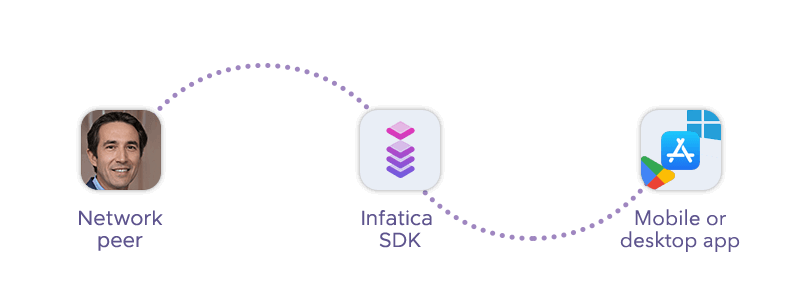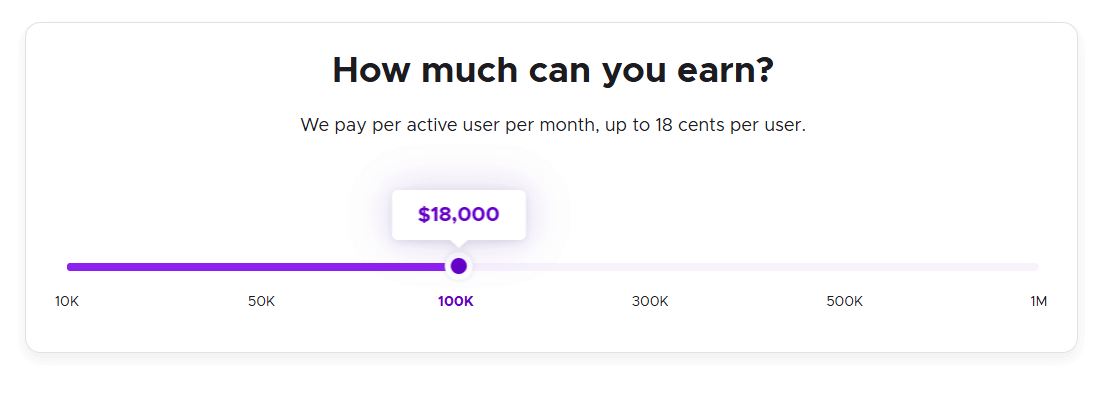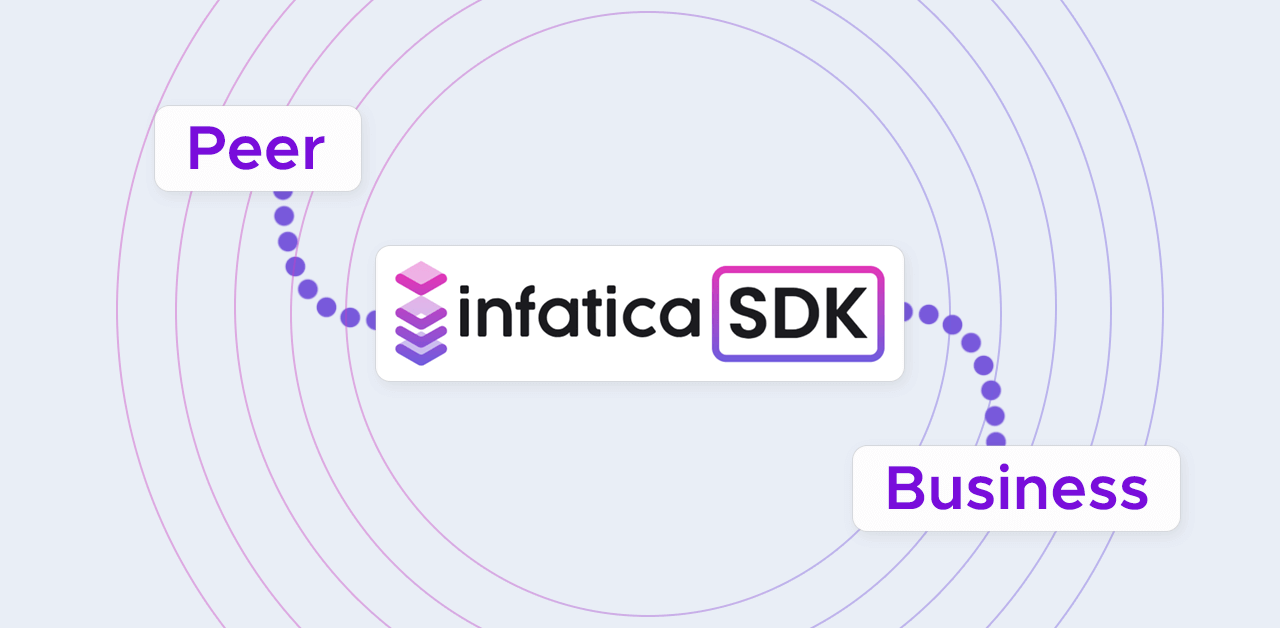App monetization has always been a balancing act: generate revenue without compromising user experience. Developers often rely on traditional methods like in-app ads, subscriptions, or paywalls – each with its own drawbacks.
Infatica SDK introduces a new approach to this challenge. It allows developers to earn revenue simply by integrating a lightweight software library into their applications. In this article, we’ll explore how the Peer-to-Business model works, what it enables, and how developers can harness it through the Infatica SDK.
What is the Peer-to-Business (P2B) Model?
At its core, the P2B model connects individual app users (peers) with businesses that need reliable access to publicly available web data. Through the Infatica SDK, each user’s IP address and idle bandwidth are securely integrated into Infatica’s peer-powered network. Businesses then route web requests through this distributed infrastructure to gather essential data – such as product pricing, search engine results, or market insights – from around the world.
Why does this matter?
As businesses increasingly rely on public web data to make informed decisions, they face growing obstacles – geo-restrictions, rate limits, CAPTCHA walls, and more. The P2B model offers a compliant, user-consented, and highly effective way to bypass these challenges.
At the same time, the app developers who power the network earn a share of the value being created – without cluttering their apps with ads or pushing users toward subscriptions.
In short, P2B is a win-win model that bridges the gap between everyday app users and the growing demand for ethical, global web data access.
How the Infatica SDK Works

The Infatica SDK is a lightweight software library designed to integrate seamlessly into desktop and mobile applications across Windows, macOS, iOS, and Android platforms. Once integrated, it enables app developers to passively monetize their user base through Infatica’s Peer-to-Business (P2B) network – without showing ads, selling user data, or disrupting the app experience.
Example in Action
Imagine a mobile weather app with 500,000 monthly active users. By integrating Infatica SDK:
- A portion of those users opt in during onboarding.
- Their devices passively contribute bandwidth to Infatica’s network.
- A business uses that network to collect real-time weather data from regional sites.
- The weather app earns ongoing revenue – all while providing value to its users, with no disruption to their experience.
Real-World Use Cases of the P2B Network
Infatica’s Peer-to-Business (P2B) network is built to serve one core purpose: enabling ethical, efficient, and geographically diverse access to public web data. Businesses across a wide range of industries rely on this data to drive decision-making, maintain competitive advantage, and monitor global digital ecosystems. The P2B model, powered by SDK-enabled peers, gives them a powerful alternative to traditional proxy networks. Let’s take a closer look at the most impactful and legitimate use cases where Infatica’s network makes a difference:
| Use Case | Who Uses It | Why It Matters | How P2B Helps |
|---|---|---|---|
| Price Aggregation and Market Intelligence | Travel aggregators, e-commerce platforms, fintech companies | Product prices vary by region and device; accurate, unbiased pricing data is essential | Real user IPs provide authentic regional pricing data, avoiding blocks and bans |
| Search Engine Monitoring (SEO) | Digital marketers, SEO agencies, ad tech firms | SERPs differ by location and user profile; precise, localized search insights are needed | Enables queries from real devices across regions for accurate search and ad monitoring |
| Brand Protection and Anti-Counterfeiting | Retailers, brand owners, IP protection firms | Detects counterfeit goods and trademark violations on unofficial sites | Mimics real user behavior to uncover infringing content without alerting bad actors |
| Market Research and Competitive Analysis | Business intelligence and consumer research firms | Collects product catalogs, reviews, and marketing data for trends and competitor tracking | Provides access to unfiltered global data with minimal risk of detection or throttling |
| Uptime and Performance Monitoring | Web infrastructure providers, SaaS companies, IT teams | Ensures websites/apps perform well globally, measuring uptime and response times | Simulates real user visits from various locations to monitor service availability |
| Academic and Non-Profit Research | Universities, NGOs, open-data researchers | Requires large-scale, geographically diverse data for studies on misinformation, pricing, etc. | Enables scalable, transparent data collection supporting reproducible research |
| Cybersecurity and Threat Intelligence | Security firms, red teams, fraud detection companies | Simulates user behavior safely to investigate threats and malicious content | Residential IPs and anonymity provide a secure, untraceable way to explore web threats |
Benefits for App Developers
For developers, monetization often comes at a cost – whether it’s cluttering the user interface with ads, adding paywalls that reduce adoption, or relying on unpredictable in-app purchases. The Infatica SDK offers a new path: a non-intrusive, privacy-conscious, and recurring revenue model built around user participation in the Peer-to-Business (P2B) network.
Passive Monetization Without Disrupting UX
Unlike ads or subscription models, Infatica SDK runs quietly in the background – with zero impact on the user interface or app flow. Once users give consent, they’re participating in the P2B network without needing to interact with anything. This means:
- No intrusive banners or pop-ups
- No compromise to gameplay, reading, streaming, or browsing
- No need to re-engage users to earn revenue
Revenue Per Active User
Infatica pays developers based on the number of active peers – users who have opted in and are contributing bandwidth through the SDK. This creates a stable, predictable income stream tied directly to user retention and growth. The more your user base grows, the more you earn – without needing to sell anything to those users.
Cross-Platform Support
Infatica SDK supports the most widely used platforms: Windows (desktop), macOS, Android, and iOS. This makes it suitable for a wide variety of apps – from utilities and tools to media players, VPNs, productivity software, and casual games. Whether you’re targeting desktop power users or mobile-first audiences, the SDK adapts to your tech stack.
Respect for Privacy and Compliance
User trust is critical, and Infatica SDK is designed to preserve it. Key protections include:
- Full opt-in consent mechanisms that are GDPR and CCPA compliant
- No access to personal files, photos, messages, or app data
- Minimal, controlled bandwidth use, with settings optimized for low impact
- Encrypted traffic routing to ensure data security
This means you can earn revenue without compromising on ethics or user safety – a critical factor in app store compliance and long-term reputation.
Alternative to Ads and Subscriptions
If your app struggles to monetize with ads due to low CPMs or user fatigue – or if subscriptions aren’t gaining traction – the Infatica SDK offers a third option that requires no payment from the user and no disruption to content flow. It’s especially useful for:
- Free apps in developing markets
- Tools and utilities with few engagement surfaces
- Apps with high user retention but low ARPU
Why the P2B Model Is the Future
As the digital economy evolves, so do the expectations of users, developers, and businesses alike. Traditional monetization models – ads, subscriptions, and paywalls – are reaching their limits. Users are increasingly sensitive to privacy violations, developers are seeking fairer and more sustainable revenue streams, and businesses require more reliable access to global data.
A Sustainable Alternative to Ads
Advertising-based monetization is plagued by low returns, ad fatigue, and growing user resistance. Many users now actively block ads, while others abandon apps that feel cluttered or exploitative.
P2B offers a clean alternative: revenue that doesn’t rely on clicks, impressions, or user attention. Instead of selling screen space, developers earn by contributing infrastructure to a real-world network that supports legitimate business needs. It’s monetization that scales with app usage, not ad engagement.
Privacy-First by Default
With global privacy regulations (like GDPR, CCPA, and ePrivacy) getting stricter, developers are under pressure to handle data ethically – or risk penalties, bans, and user backlash. The P2B model, as implemented by Infatica, respects user consent and data boundaries from the ground up:
- No tracking
- No behavioral profiling
- No invasive permissions
Monetization That Grows With You

Whether your app has 10,000 users or 10 million, the P2B model offers linear scalability. Your revenue increases naturally with user growth and retention – without requiring additional features, content, or monetization hooks. This is particularly powerful for:
- Utility and productivity apps
- Lightweight tools with long user lifespans
- Global apps serving developing markets with low ad CPMs
Powering a More Ethical Data Economy
The global demand for publicly available web data continues to rise – across industries like e-commerce, cybersecurity, finance, and research. But many traditional data collection methods (like data centers and bot networks) raise red flags, trigger blocks, and are often viewed as exploitative.
The P2B model solves this by introducing real users into the equation, with full consent and security. This provides businesses with cleaner, more trusted access to web data – while also giving back to the users and developers powering the system.
Future-Proof Against Platform and Policy Shifts
App stores and platforms are becoming increasingly critical of monetization practices that use hidden tracking, overuse system resources, or violate transparency standards.
Infatica SDK is designed to remain invisible to the user experience but fully visible to regulators and platforms. With built-in transparency, strict compliance controls, and a passive footprint, it is far more resilient to future policy shifts than ad SDKs or data brokerage models.
Frequently Asked Questions
What is the Peer-to-Business (P2B) model?
P2B connects app users as passive peers in a secure network, allowing businesses to access public web data through their IP addresses. Developers earn revenue per active user without disrupting the app experience.
How does Infatica SDK protect user privacy?
The SDK only shares the device’s IP address and minimal idle bandwidth, with no access to personal files or sensitive data. All participation is opt-in, GDPR/CCPA compliant, and traffic is fully encrypted.
Which platforms support Infatica SDK?
Infatica SDK supports Windows, macOS, Android, and iOS, enabling developers to monetize apps across desktop and mobile environments with consistent privacy and performance standards.
Does the SDK affect app performance or battery life?
No. The SDK activates only under low-impact conditions, such as when the device is idle, charging, and on Wi-Fi. It’s optimized for minimal CPU, battery, and bandwidth use.
How do developers earn money with Infatica SDK?
Developers receive recurring payments based on the number of active users who opt into the P2B network. The more active peers your app has, the higher your potential revenue.
